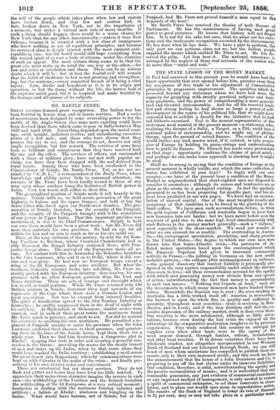MR. BARTLE FRERE.
GREAT services demand great recognition. The Indian war has been fruitful in heroic men and in heroic services. Had a series of occurrences been designed by some overruling power to try the mettle of the Anglo-Saxon race none more exacting could have been devised than those which came to pass in India between May 1857 and April 1856. Everythin„„e depended upon the moral cour- age, swift insight, judicious resolve, and unfaultering executive power of a few men ; and those who have shown that they possess the eye to see, and the courage to act, deserve not only ample recognition, but fair reward. The services of some have been so brilliant and conspicuous that they have received both the one and the other. The services of others, not surrounded with a blaze of military glory, have not met with popular ac- claim, nor have they been stamped with the seal derived from royal hands. Among those who have been overlooked is the Commissioner of Scinde, Mr. Bartle Frere. Yet, as we are re- minded by "C. D. L.," a correspondent of the Daily News, whose knowledge and ability never fails to command attention, the services of Mr. Frere have been hardly second to those of any man upon whose conduct hung the destinies of British power in India. Very few words will suffice to show this. The geographical position of Scinde made it tell heavily in the mutiny. Scinde with us, we held secure possession of the great highway to Lahore and the upper Ganges, and held at bay the fierce tribes who dwell upon our North-west frontier. The pre- servation of Scinde, therefore, was the security of the Punjaub, and the security of the Punjaub brought with it the restoration of our power in Upper India. That this important province was maintained, is due to its Chief Commissioner. Simply to hold our own there would have been a great work ; but Mr. Frere did more than maintain his own province. He had an eye for all within his ken and an arm to reach as far as his eye could see. Thus, at the very outbreak of the mutiny, he sent the 1st Bom- bay Fusiliers to Meehan, where Crawford Chamberlain had so ably disarmed the Bengal Infantry stationed there, with Pun- jaubee troops alone. The arrival of the Europeans made all se- cure. Not content with this he forwarded the Beloochee battalion to Sir John Lawrence, who sent it on to Delhi, where it did ser- vice and won glory. He had now no European troops except a wing of the 2d Europeans, and some artillery. But when the Southern Mahratta country broke into rebellion, Mr. Frere in- stantly parted with his European infantry, thus leaving his own province with no other European garrison than the Foot and Horse Artillery. These are acts of courage and foresight which few would or could perform. While Mr. Frere retained only 350 British soldiers in Scinde, Governor Grey kept upwards of six regiments at the Cape where there were a German Legion and loyal population. Nor was he exempt from internal troubles. The spirit of disaffection spread to the 21st Bombay Infantry at Kurrachee ; he swiftly suppressed them in the dead of night with his artillery. At Hy derabad, at Shikarpore, similar scenes were enacted, and in each of these great towns the mutineers found Mr. Frere quick to perceive, and swift to act. Nor did he restrict his exertions to quelling his own mutineers. He permitted a re- giment of Punjaub cavalry to enter his province when Sir John Lawrence preferred their absence to their presence, and quarter- ing them in the lines of the Scinde horse, kept them there for a whole year. Then we find him frustrating a dangerous plot in Khelat ; keeping that state in order and securing a peaceful suc- cession to the throne ; providing the means for the steady transit of men and stores up the Indus, when by that route alone they could have reached the Delhi territory ; establishing a mail across the great\ desert into Rajpootana, whereby communications were kept. up .w\th Calcutta in the midst of the crisis ; and finally pre- serving in Ins own district order and contentment.
These are substantial but not showy services. They do not flash and glitter and hence they have been too little noticed. To appreciate their momentous character imagine the reverse in each ease—the withholding of the Fusiliers and the Belooch battalion the withholding of the 2d Europeans at a very critical moment ; hesitation in dealing with the mutinous Bombay infantry and artillery ; a failure at Khelat ; slackness and bungling on the Indus. What would have become, not of Made, but of the Punjaub, had Mr. Frere not proved himself a man equal to the demands of the hour
Mr. Bartle Frere has received the thanks of both Houses of Parliament. He has the consciousness of having used great power to good purposes. He knows that history will not forget him. It is not for his sake but ours, that we point out his exer- tions and the inadequate recognition accorded by the Government. He has done what he has done. We have a part to perform, the only part we can perform, since not we, but the Indian people supplied the means which enabled Mr. Frere to act. He has de- served the palm. Let him bear it. The national conscience is outraged by the neglect of those real servants of the nation wha do more than "stand and wait."


























 Previous page
Previous page